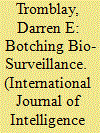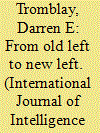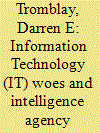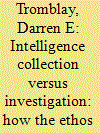| Srl | Item |
| 1 |
ID:
188272


|
|
|
|
|
| Summary/Abstract |
The global COVID-19 pandemic was an intelligence failure, with a death toll orders of magnitude greater than the 11 September 2001 (9/11) attacks on the United States. Multiple factors—of both political and policy natures—contributed to the catastrophe. One area that warrants scrutiny is the United States’ capability for bio-surveillance: identifying the presence of a pathogen before it can take hold within a population. Since 2003, the Department of Homeland Security (DHS) has had a responsibility for one line of defense against biological disasters and yet has stumbled toward implementing that defense, while promising a sense of security that it cannot deliver.
|
|
|
|
|
|
|
|
|
|
|
|
|
|
|
|
| 2 |
ID:
167476


|
|
|
| 3 |
ID:
161731


|
|
|
| 4 |
ID:
171252


|
|
|
| 5 |
ID:
154864


|
|
|
|
|
| Summary/Abstract |
The Federal Bureau of Investigation has experienced a number of high-profile failures – across nearly four decades – in developing its Information Technology (IT) infrastructure. Repeated missteps are indications of problems with the Bureau’s broader culture that degrade its effectiveness across missions. A significant factor contributing to this dysfunctional culture is the diversification of the FBI’s responsibilities, to the point of losing a corporate identity. Reform will require an assessment of the Bureau’s purpose, the elements which it should retain in furtherance of this vision, and the steps to align its workforce with the competencies necessary to pursue this mission.
|
|
|
|
|
|
|
|
|
|
|
|
|
|
|
|
| 6 |
ID:
179156


|
|
|
|
|
| Summary/Abstract |
The modern U.S. foreign intelligence apparatus is not sui generis. It is, instead, the product of evolution both in the United States’ perceptions about its role in the world and in the bureaucratic architecture that Washington has established to contend with global developments that impact the homeland. Although the accepted narrative of the Central Intelligence Agency’s (CIA)’s origin focuses on the Office of Strategic Services (OSS), and that organization’s operations abroad, there is another contributor—the Federal Bureau of Investigation (FBI)—to the formation of the United States’ foreign intelligence apparatus.
|
|
|
|
|
|
|
|
|
|
|
|
|
|
|
|
| 7 |
ID:
158525


|
|
|
|
|
| Summary/Abstract |
Russia’s evident attempts to interfere with the 2016 U.S. presidential election, as well as the plague of “fake news” and the neologism of “alternative facts,” highlight the importance of ensuring informational integrity in policymaking. Think tanks have long been a significant influence in this area and, as a result, have been increasingly targeted by foreign governments seeking to surreptitiously inject their preferences into the American policymaking process.
|
|
|
|
|
|
|
|
|
|
|
|
|
|
|
|
| 8 |
ID:
161535


|
|
|
|
|
| Summary/Abstract |
There is an inherent tension between a law enforcement–driven approach and a requirementsdriven approach to intelligence collection. The US experience, with the development of the Federal Bureau of Investigation(FBI), as the primary intelligence service within the domestic environment, suggests that the tension is nearly insurmountable if an organization starts from a reactive, threat-focused posture. As a law-enforcement agency, which US government decision-makers expect to fulfill an intelligence function, the FBI is triply handicapped by the external strictures of the Department of Justice (DoJ); the Bureau’s own policies – which respond to the DoJ parameters; and the FBI’s organizational culture.
|
|
|
|
|
|
|
|
|
|
|
|
|
|
|
|
| 9 |
ID:
181300


|
|
|
|
|
| Summary/Abstract |
The Federal Bureau of Investigation (FBI), although it is a domestically oriented intelligence service, must contend with foreign state, terrorist, and criminal entities. Foreign language capability is integral to countering many of these threat actors. The FBI has developed its foreign language workforce and associated infrastructure in response to the evolution of its mission. This was a learning process for the FBI and progressed from utilization of personnel who had language skills, or who were trained on an ad hoc basis, to establishing a dedicated workforce of linguists. This evolution highlights the need for organizations to assess needs and build toward workforces defined by subject matter expertise, rather than taking a one-size-fits-all approach. As the FBI’s history in the field of language illustrates, expertise will eventually become a necessity. Workarounds, whether in language, information technology, or any other field, will only ultimately delay the development of capabilities.
|
|
|
|
|
|
|
|
|
|
|
|
|
|
|
|
| 10 |
ID:
186402


|
|
|
|
|
| Summary/Abstract |
Intelligence services—among other entities—must organize information in ways that facilitate their operations. The information technology (IT) that agencies develop follows the contours of how agencies use data in furtherance of their objectives. Therefore, it can be read as a microcosm of agencies writ large. The Federal Bureau of Investigation (FBI)’s use of IT provides a case study of this. IT evolved to serve the needs of individual programs (e.g., counterintelligence, criminal investigations) and only once this had occurred did the FBI begin to develop a corporate enterprise architecture aimed at integrating the organization’s multiple facets. Examining the evolution of the FBI’s IT serves multiple purposes. From a historical perspective it provides insights into the institutional thought process, reflected in IT decisions, that drove operations. It also provides a lens through which to assess future development of IT systems—specifically, how an IT decision will impact the FBI’s culture and ability to effectively carry out its mission.
|
|
|
|
|
|
|
|
|
|
|
|
|
|
|
|
| 11 |
ID:
145593


|
|
|
|
|
| Summary/Abstract |
In the nearly 15 years since the events of 11 September 2001, the Federal Bureau of Investigation (FBI) has undertaken a succession of efforts to become an agency capable of fulfilling the intelligence functions with which it has been entrusted. However, historically, the FBI’s experience with intelligence has been reactive due to a law enforcement culture that closed cases rather than identified ways to keep opportunities for collection open, as well as bureaucratic wariness due to the differing expectations from one Presidential administration to the next. The Threat Review and Prioritization (TRP) process is the most recent iteration of the Bureau’s attempt to organize as an intelligence service. However, TRP is informed not by a mission of developing intelligence that will help to disrupt emerging threats or exploit opportunities at both the strategic (policymaking) and tactical (arrests), but instead reactively focuses on the threats which have become fully manifest within the FBI’s own domain. TRP leaves the US at a disadvantage vis-à-vis state and non-state adversaries and competitors. Organizationally, it institutionalizes the shortcomings of reactivity and insularity that were the unfortunate characteristics of the pre-9/11 FBI.
|
|
|
|
|
|
|
|
|
|
|
|
|
|
|
|